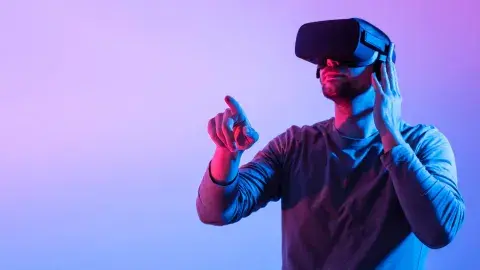José Martínez arrived at his class by placing a headset on his face. In seconds, the city of Athens appeared in front of him in flames, while the statue of the goddess Athena fell at his feet. This immersive virtual reality experience is part of one of his classes: a kind of educational metaverse.
“You really feel like you’re in the city. I didn’t recognize the importance of these civilizations until I was able to be there,” the student shares.
Virtual reality, which recreates scenes and images that provide a realistic feeling, is one of the resources that are increasingly used in this university, says Beatriz Palacios, leader of Educational Innovation and Digital Learning.

The Tec had already begun working on immersive technologies before the pandemic, taking the first steps towards a virtual educational world, an outline of an alternate universe or “educational metaverse,” as Palacios considers it.
Although the subject has been on everyone’s lips since the announcement a few months ago by Facebook founder Mark Zuckerberg that they were developing their own Metaverse, a virtual universe to connect people, the Tec had already been working on this type of scenario for years, she adds.
“These new platforms and media to access knowledge content are happening in multiple sectors, and education shouldn’t get left behind,” says Palacios.

There are also other types of emerging technologies that allow students to experience their classes in different ways which promote greater involvement in the acquisition of their learning, explains Ana Rodríguez, leader of Educational Innovation.
“There are experiences to practice decision-making and interact remotely, as well as engineering laboratories that can be controlled from wherever you are.
We also have three-dimensional models of complex or scientific processes such as the human body or mathematical equations that you can explore in a virtual format,” says Rodríguez.

For both specialists, these immersive learning experiences have not been developed only to have something striking for students.
“The idea isn’t to use technology just for the sake of using it but to utilize it as a means to enhance the teaching and learning process,” says Rodríguez.
To that end, it has been the teachers at the different Tec campuses who have promoted many of these experiences. Palacios explains that, thanks to the support of educational innovation teams, they have managed to scale these technologies so that they reach more and more students.
Studying in the educational metaverse
The pandemic advanced many of the technologies that were seen as being in the future, Palacios believes. The Tec Virtual Campus project is an experience for collaboration, socialization, and imparting knowledge in a digital world.
“It’s a digital space on a platform called Virbela, which our students can access with freedom of movement through a customizable avatar as if they were on the physical campus,” says Irving Hidrogo, director of Innovation with Emerging Technologies.
This environment, which bears some resemblance to what Zuckerberg is looking for with his Metaverse, allows students to create exhibits, work on projects, attend classes, and even interact. All that is needed is a computer and access to the Internet.
“It’s breaking down geographical boundaries. They experience it as if they were all in the same place but without the physical limitations of the world,” reiterates Hidrogo, who points out that there are already more than 6,000 students who use it.
“They experience it as if they were all in the same place but without the physical limitations of the world.”
The Tec expert sees this virtual campus as a technological tool with the potential to become an educational universe where institutions around the world can be connected.
“It isn’t an island but a platform that allows for experience beyond what we do at Tec de Monterrey, working with other universities and agencies to create spaces for digital coexistence in accord with our values,” he says.
Palacios calls this evolution “the classroom of the future,” in which technologies and services can be gathered to match or surpass traditional learning experiences.
“In the classroom of the future, it’s important that technology gives students an added value that can’t be found in a traditional classroom,” says Palacios.
“As educational institutions, we need to see that metaverses can democratize education. We’re fighting for that, and we’ve started at home,” concludes Hidrogo.
*Article published in the CONECTA section of the Tec Review magazine. You can consult more stories in Issue 39.
YOU’LL SURELY WANT TO READ:






